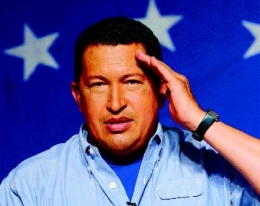Students, intellectuals, hu-man rights activists or anyone interested in understanding how a participative democracy works should consider a trip to Venezuela.
 The South American country is without question the most democratic place on the planet. Yet Western states – in particular the United States – never cease to demonise the Venezuelan President Hugo Chávez, portraying him as a ‘dictator’. But this demonisation of popular democratic leaders is quite par for the course for the US military-industrial-media complex and in Europe’s hegemonic right-wing press.
The South American country is without question the most democratic place on the planet. Yet Western states – in particular the United States – never cease to demonise the Venezuelan President Hugo Chávez, portraying him as a ‘dictator’. But this demonisation of popular democratic leaders is quite par for the course for the US military-industrial-media complex and in Europe’s hegemonic right-wing press.
Recently I visited Venezuela in order to find out what exactly was going on there, and whether the progress which so many on the left have talked about bore any relation to reality. I went as a delegate of Sisa (Syndicate Indipendente Scu-ola e Ambiente), an Italian-based education and ecology syndicate, and stayed with colleagues from Italy, France and Switzerland in a poor district outside the capital, Caracas. Our accommodation was extremely basic and would be considered sub-standard in Europe.
The lady who manages the house also lives there; she’s an official in Venezuela’s Department of Foreign Affairs. I was struck by the fact that someone who works for the government should live in such humble accommodation. But this is socialist Venezuela. These people are pioneers of a new society based on sharing and compassion, rather than greed and egotism.
During my stay I met many journalists and officials who had flown with the president to Paris and Tehran. One journalist told me that her involvement in the Bolivarian revolution actually took over her life. Her devotion to Chávez’ politics reached such proportions that her neglected boyfriend gave her an ultimatum: “It’s either me or Chávez.” She chose the president, and has no regrets!
Travellers from Europe brought up in the cynical politics of capitalist democracies might find the cult of personality that surrounds the Venezuelan president rather suspect. It is true that posters and portraits of Chávez tend to be found all over the country. But that is merely because the Venezuelan president is extremely popular.
There are very simple reasons for this. Before Chávez assumed power, most of the country’s wealth went into the hands of a tiny oligarchy, while 80 per cent of the population languished in poverty. President Chávez has since transformed the distribution of wealth in the country.
I visited many of the projects set up by the Venezuelan government over the past decade dedicated to sharing the wealth. The Salvador Allende Health Clinic in Caracas is a potent example of what a socialist society stands for – the result of an exchange whereby Cuba sends doctors to Venezuela in return for cheap Venezuelan oil.
I had the privilege of a guided tour of the centre, where I spoke to many patients and Cuban doctors. The service and medication there is entirely free, the standard of medical technology and hygiene is second-to-none, and all the patients I met told me that the Cuban doctors are the best in the world for care and devotion.
One of the doctors told me that people from the wealthier classes also avail of the free health system when their insurance policies run out. “Such people have often been abusive towards us, claiming that we are ‘third world doctors’,” he said, “but when they see the standard of care here, their attitude often changes.” According to him, many of the anti-Chávez bourgeoisie leave the clinic ‘cured’ of their anti-social prejudices and now vote for Chávez.
Another spot I visited was the poor district of Las Minas in Caracas, where I attended a local meeting. The locals were discussing what they would do with the money the government had given them for social projects. These heroic people had marched to the Palacio National to demand the return of their president after the US-backed military coup in 2002, the events of which were movingly captured in an Irish documentary, The Revolution Will Not Be Televised. I was deeply impressed that the government lets the people decide what they want to do with the money they give them. This sort of community-based participatory democracy does not exist anywhere else in the world.
These of course are just a handful of the many memorable moments on my journey. I had the best and cheapest meal of my stay at a government-funded socialist restaurant, before visiting new state-funded universities and modern social housing projects in what were once slums. I even spoke to young volunteers of the Missión Revolutión Energetica, who are replacing the country’s lights with Cuban bulbs that consume 80 per cent less electricity.
As for ‘freedom of expression’, Venezuelans can watch the fascist Fox News in Spanish and buy right-wing Columbian newspapers at every stand – or pick up one of the new left-wing papers instead. Such a range of views would surely be impossible in any other country.











